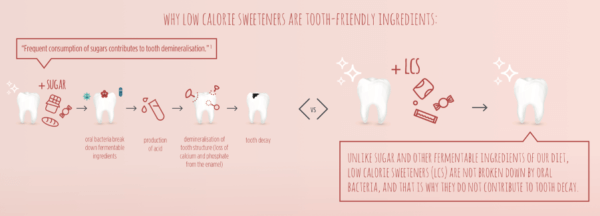Benefits for oral health
Low/no calorie sweeteners can contribute to good dental health when used in place of sugar. As they are not fermentable ingredients – which means they are not broken down by bacteria in our mouth – low/no calorie sweeteners do not contribute to tooth decay.
The beneficial role of low/no calorie sweeteners in dental health is well established. Reviewing the scientific data in 2011, the European Food Safety Authority (EFSA) Panel on Dietetic Products Nutrition and Allergies concluded that there is sufficient scientific information to support the claims that intense sweeteners, as all sugar replacers, maintain tooth mineralisation by decreasing tooth demineralisation if consumed instead of sugars.1 Based on this scientific opinion from EFSA, the European Commission authorised the health claim that the consumption of foods containing low calorie sweeteners instead of sugar contributes to the maintenance of tooth mineralisation.2
Low/no calorie sweeteners are tooth-friendly ingredients
The most common oral diseases, caries and periodontal diseases, are largely preventable and more caution needs to be put into prevention and self-care.3 Caries are caused by bacterial fermentation of carbohydrates on tooth surfaces after meals and snacks, causing demineralisation of the hard tissues.
On the other hand, low/no calorie sweeteners are not fermentable, and do not contribute to tooth decay, and that is why they have the benefit of being tooth-friendly ingredients.4,5
Studies also show that products such as sugar-free chewing gum, which contains low/no calorie sweeteners, substantially reduce the risk of tooth decay. In 2010 EFSA concluded that there is a cause and effect relationship between the consumption of sugar-free chewing gum and reduction of tooth demineralisation and incidence of caries.6
Low/no calorie sweeteners are also frequently used in toothpaste, mouthwashes and fluoride supplements that assist dental hygiene.
For more information on the role of low/no calorie sweeteners in oral health we invite you to download the ISA factsheet ‘Low/no calorie sweeteners and their beneficial role in oral health‘ and the infographic ‘Low calorie sweeteners in dental health: tooth-friendly ingredients‘.
- Scientific opinion on the substantiation of health claims related to intense sweeteners. EFSA Journal 2011, 9(6), 2229. Available online: http://onlinelibrary.wiley.com/doi/10.2903/j.efsa.2011.2229/epdf
- Commission Regulation (EU) No 432/2012 of 16 May 2012 establishing a list of permitted health claims made on foods, other than those referring to the reduction of disease risk and to children’s development and health.
- FDI World Dental Federation. The Challenge of Oral Disease – A call for global action. The Oral Health Atlas. 2nd ed. Geneva. 2015. Available online: https://www.fdiworlddental.org/sites/default/files/2021-03/complete_oh_atlas-2_0.pdf
- FDI World Dental Federation Policy Statement: Sugar substitutes and their role in caries prevention. Adopted by the FDI General Assembly, 26 September 2008, Stockholm, Sweden. Available online here: https://www.fdiworlddental.org/sugar-substitutes-and-their-role-caries-prevention
- Gupta P, et al. Role of Sugar and Sugar Substitutes in Dental Caries: A Review. ISRN Dent. 2013:519421
- EFSA Panel on Dietetic Products, Nutrition and Allergies (NDA); Scientific Opinion on the substantiation of a health claim related to sugar-free chewing gum and neutralisation of plaque acids. EFSA Journal 2010;8(10):1776. [14 pp.]. Available online: http://www.efsa.europa.eu/en/efsajournal/pub/177614


